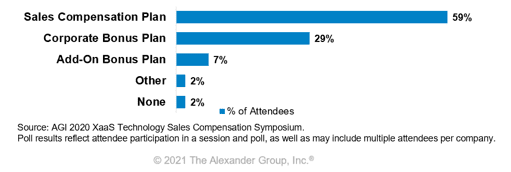XaaS Customer Success Managers Part III: Compensation
How companies use can Customer Success Managers differ dramatically.
Part I of this three-part series discussed the different types of CSM jobs. Part II discussed how best to deploy CSMs – that is, how to ‘assign’ them – by segment, account, seller, team or pooled (i.e., CSMs deployed based on availability and assigned to opportunities as they arise).
Part III: Compensating Customer Success Managers
This final part of the series discusses how companies compensate their CSMs. Although there are multiple elements that need to be determined, we will focus on two critical factors: plan structure and measures. As shown in the table below, there are four incentive plan structure options: corporate plan, professional service plan, add-on bonus plan, and an at-risk sales compensation plan.
CSM Incentive Plan Structure Options

Service and Adoption CSMs: When the job is focused on service and/or adoption activity that is difficult to measure, many companies will put their CSM job on their corporate plan. These jobs tend to not have any sales or service expectations.
Professional Service CSMs: Some CSMs are part of a professional services (PS) organization and paid for directly by the client. If this is the case, then the CSM plans tend to mirror how the general PS jobs are compensated—a corporate plan or a separate PS plan.
Adoption and Sales CSMs: When the job has adoption with some sales expectations (even if it is only to support sales), companies will place their CSMs on either an add-on bonus plan or an at-risk sales compensation plan. Add-on bonuses are incentive programs that provide additional payout above and beyond their base salary and the incentive is expressed as a percent of base salary. At-risk sales compensation plans provide a target total compensation (TTC) level and then apply a pay mix to derive the base salary and target incentive. For example, a CSM job with $100k TTC and 80/20 pay mix will have $80k base salary and $20k target incentive.
Most companies put their CSMs on a sales compensation plan or a corporate plan. The graph below provides some benchmark practices from our last XaaS Technology Sales Compensation Symposium.
CSM Incentive Practices

There are a variety of measures companies use to reward their CSMs. The table below outlines each of them.
CSM Customer Success Metric Options

- Revenue – Companies with consumption pricing models and/or recognize their revenue as their offering is consumed generally use recognized revenue.
- Adoption – There are three primary adoption-type metrics that align to a company’s pricing model that are commonly used:
- Users/Seats/Licenses
- Credits/Tokens/Terabytes
- Features/Devices Used
- Scorecards – Some companies with many products will use a more complex scorecard containing multiple metrics including adoption, health scores and/or other indicators.
- Customer Outcomes – Measuring your customers’ outcomes based on the use of your offering is the ultimate method to measure how your customers are gaining value from your offering, however companies rarely used due to challenges setting, tracking and goaling on these metrics.
- Customer Satisfaction – Some companies that leverage a third-party company to measure net promoter scores and other customer satisfaction scores may incorporate a customer satisfaction metric into their CSM plan.
Recurring revenue models require the revenue leaders to place significant emphasis on keeping and growing customers once they have been acquired. The finance community likes the predictability and profitability of a recurring revenue stream. The reality for revenue leaders in recurring revenue models is they must continually “win” the customer’s business or risk churn. The CSM is a key role leveraged to protect the base, drive expansion and ultimately maximize customer lifetime value.
Questions & Next Steps
The Alexander Group provides consulting services to companies building out their Customer Success organizations. For more information, visit Alexander Group’s Technology practice, or schedule a complimentary briefing with one of our technology practice leaders.

